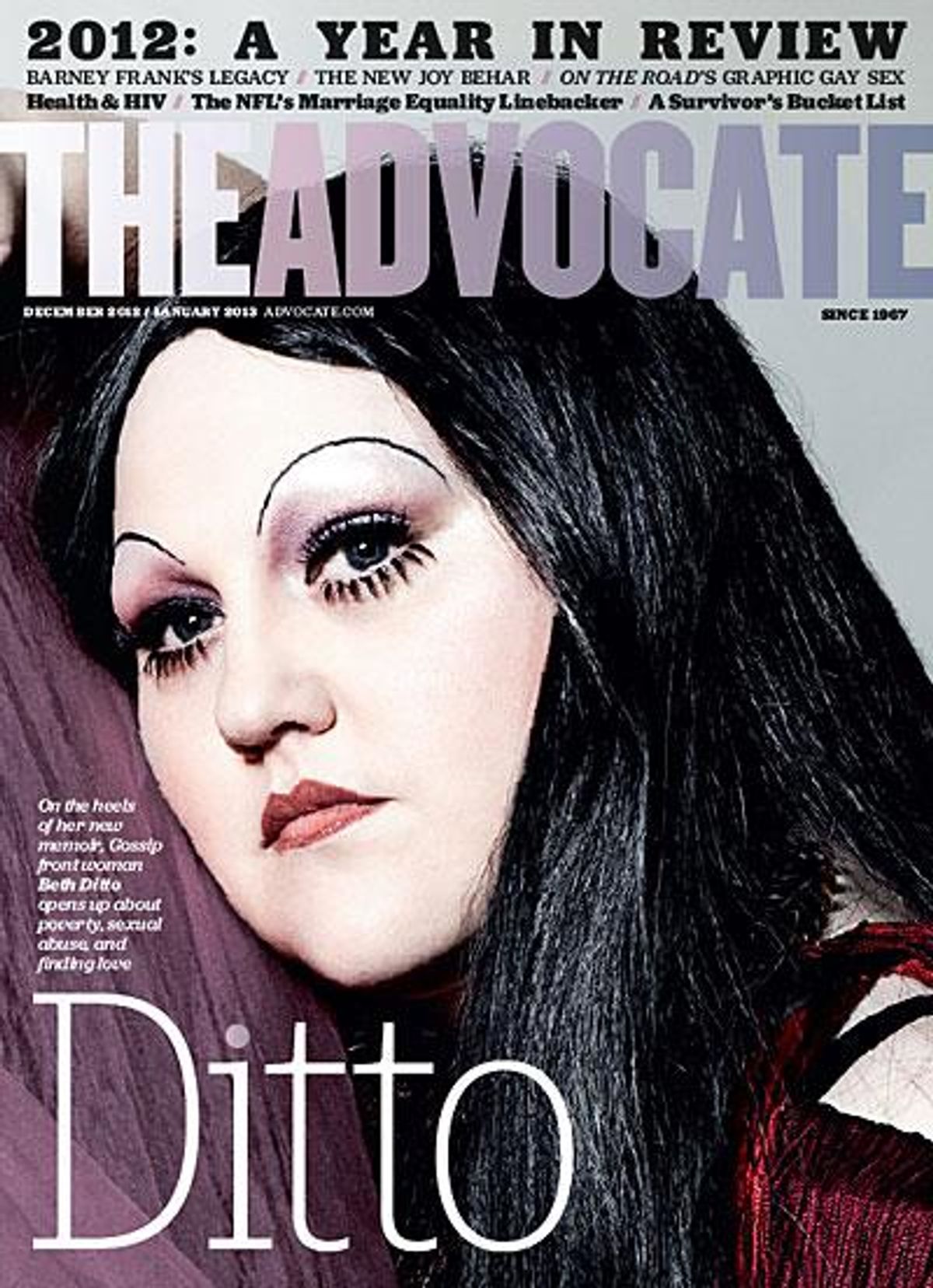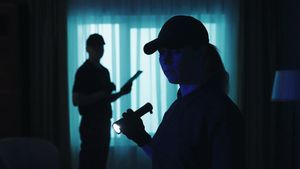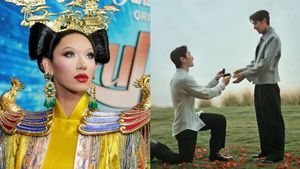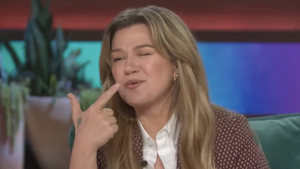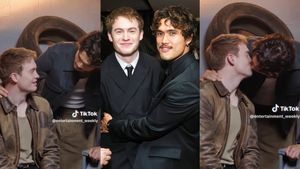Twenty years ago, Beth Ditto was a loud, fat, sexually confused choir nerd with permed hair and a Kool-Aid dye job in rural Judsonia, Ark. It was a town where girls often got pregnant before high school ended, as Ditto's mother, Velmyra, did. When Ditto was a child, she didn't yet know the truth about who her biological father was (it was, she thinks, "too sad and exhausting" for her mother to explain it), and her mother was overwhelmed by the demands of men, motherhood, and rural poverty. Ditto was shuttled between the homes of Velmyra and her foul-mouthed aunt Jannie, the beloved dictator of a house filled with neglected kids.
In her new memoir, Coal to Diamonds, Ditto writes about growing up poor in the South in a "shit town" where squirrel was an acceptable snack and coming of age "is fast and harsh." She continues, "Women in Judsonia never had a break to catch their breath or to ask themselves what the hell happened.... Young women pull a bunch of children into the world behind them, without a rest for their brains or their bodies or their hearts. No space to understand the abuse that had happened, never mind time to figure out how to unlearn what they didn't even know they'd been taught, or to have a fighting chance to break the cycle."
Today, Ditto, 31, is a world-famous iconoclast, the reigning queer queen of indie music. Ditto has revolutionized fashion by insisting that big girls need a place at the table. She's become a muse to a host of fashion designers, launched her own fashion line with Evans in the U.K, and walked down the runway for designer Jean Paul Gaultier. She was the face of Donatella Versace's Versus line at Milan Fashion Week in September and has launched her own line for MAC Cosmetics.
Then, of course, there is the music. Ditto is one of three members of Gossip, a post-punk indie rock band formed at the end of the riot grrrl days in Olympia, Wash., in 1999. Gossip's newest album, A Joyful Noise, debuted in Billboard's top 100 in the U.S., but in Europe -- where Ditto enjoys David Hasselhoff-like fame -- it reached the top 5 in four countries: Austria, France, Germany, and Switzerland (where it was number 1).
The group's previous album, Music for Men, sold over a million copies worldwide; the gold record hangs in Velmyra's double-wide trailer. In 2007, after Gossip performed on Friday Night With Jonathan Ross (he's the U.K.'s equivalent of David Letterman), the band became celebs and Ditto was vaulted into superstardom.
That same year, NME magazine, having previously voted her the coolest person in rock -- the first such designation for a woman -- featured her on the magazine's cover naked. The U.K. stood up to applaud, and feminist legend Germaine Greer, praised the singer in The Guardian: "NME had enough courage to put the coolest woman on the planet on the cover, and Beth Ditto has given them the kind of picture that they can use: attention-getting but certainly not obscene.... Her intention is to force acceptance of her body type, 5ft tall and [210 pounds], and...to challenge the conventional imagery of women."

Ditto's strategy worked, and soon followed more fashion adoration, her first time playing the Cannes Film Festival, the much-heralded (also nude and unretouched) debut cover of Love magazine, and meeting her idol, John Waters, while playing the Coachella Music Festival.
But before all the fame and fortune in Europe came, Gossip's star was on the rise but Ditto's body and mind were failing her. When she was 24, she began losing her vision and her voice, her weight plummeted, and she lost equilibrium in the shower. She was terrified that she would never speak, much less sing, again. "I was losing my voice. I literally couldn't speak, couldn't swallow, my throat was paralyzed," she recalls. "I was thinking, I have to think of something else to do, but I don't know how to do anything else. And that was really frightening."
To add insult to injury, while Gossip was becoming a critical success, none of the band mates were rolling in dough yet. It was 2005, just before their third album came out and two years before mainstream success. Ditto was still pilfering food from "whatever crappy job" she held in between albums and tours, shoplifting makeup, and living in a dilapidated "carny punk" house with all her friends. It was the "backwoods Southern experience of college dorm living," she writes in her book.
The crooner certainly didn't have health insurance. She was terrified when doctors told her she'd go blind if she didn't get immediate treatment. "I kept thinking, I don't have money to do this. I don't even have a hundred dollars in my pocket to pay for the fucking co-pay, let alone [the rest]."
She was diagnosed with sarcoidosis, a rare immune-system disorder that attacks the internal organs. Few Americans had ever heard of the disease before it killed comic Bernie Mac in 2008.
"I'm so lucky that my disease was so fucking weird and with a really strange version of it," Ditto says, laughing, "because the doctors were super interested. They would comp things, they would give me a discounted rate because it was so weird that they were intrigued -- and thank God for that. I know that sounds totally weird. It was really surreal."

Above: Ditto in the 90s.
Battling the sarcoidosis wasn't the only issue at play, and as her health began to improve, Ditto had to deal with a "backed-up lifetime of festering sadness" that plunged her into a serious depression. So a band mate's then-girlfriend drove her to a psychiatric hospital and Ditto checked herself in to prevent her own suicide. "I needed babysitting," she says, and that's where adults go to make sure they aren't alone. Just as doctors had saved her body, therapists, she says, saved her mind.
Ditto is en route to her therapist's office today, in fact, sporting pants she got at Walmart and stopping to say hello to her neighbors -- a nursing home attendant, a couple who live off disability -- like any other Portlander, fame be damned. In fact, Ditto is able to remain nearly invisible in her adopted hometown of Portland, Ore. She thinks sexism keeps Gossip from getting much media attention there, even when the band wins awards or break records. But it helps when she wants to live an ordinary queer life, like today.
Her therapist has helped her get control over the figurative negative voices in her head, something she says all LGBT people should do. "Don't judge them, don't discard them necessarily, don't fight them off. Just know what you're thinking."
What Ditto had to confront in that psychiatric hospital wasn't your usual quarter-life crisis. She had to deal with having been molested by her uncle as a child and being disappointed that nobody, including her mother, stepped in to stop it. Ditto says it took the sarcoidosis to push her to reconcile her abuse and disillusionment.
"I woke up and I was 24 one day and I was having a really hard time. I was really sick. And I just called her. I was like, 'Look, I need to talk to you about something. I need you to listen. I need you to apologize to me. And we'll never have to talk about it again.' And I did. And she did. And we got super emotional. We were on the phone for a couple of hours. I could hear it in her voice just how small it made her feel."
Ditto says being a feminist and understanding the cycles of abuse that women go through, it wouldn't "be any good for me to harbor those resentments toward my mother when she in fact was a victim of it herself. She did the best that she could. I think when I put all of that into perspective it becomes really easy for me to just forgive."
Her mother -- who, as an abused 12-year-old, found herself in court while attorneys debated whether she had in fact been raped -- never had access to therapy. "She wasn't reading The Courage to Heal, she wasn't reading these books. I mean, Courage to Heal saved my fucking life. And my mom didn't have that. My mom was raising babies. And she didn't have time to contemplate life."
Smart, giggly, surprisingly unassuming and friendly, Ditto in person is much more approachable than the bold, brash, and larger-than-life persona she presents on the world stage. Singing since she was 6 years old, Ditto believes her mom cast "weird spells" over her that have protected her through the years. One of them came just after Ditto began to realize she was queer during high school -- she immediately tried to get pregnant, to disprove the lesbianism, with her then-boyfriend Anthony.
"I always think about how much of a struggle that would be, where I would be in my life. I feel like I'd be pretty miserable. I definitely don't think I'd be a singer in a band. I think I'd probably be a hairdresser. Maybe I'd work at Walmart."
Anthony put the kibosh on Ditto's teen baby-making plans. "Thank God I had a really smart boyfriend who was like, Are you fucking crazy? Well, I'm not ruining our lives. To this day, I can't speak of him highly enough and how wonderful he was," she says. "He had so much to do with that, with me coming out and stuff like that. I could talk to him about it.

Ditto performing in 2007 at the London Astoria.
Indeed, Ditto did come out and she left Arkansas with her best gay friend, Jeri, and her future Gossip cofounders, drummer Kathy Mendonca (who quit the band in 2003) and Nathan Howdeshell (a.k.a. Brace Paine, who she says singlehandedly created a punk scene in their small Arkansas town). Always flamboyant and stylish, Howdeshell was "harassed more than anyone I knew," Ditto says. The "fag bashing" from logging-town locals in Olympia was intense, and even though he wasn't gay, Howdeshell bore the brunt of much of it, including a violent physical assault in front of their home.
Olympia, then the center of all riot grrrl and indie music, was a godsend. Ditto says had her mom not urged her to go, she wouldn't have the life she does have. But, coming from the roots of the riot grrrl movement that abhorred capitalism, does Ditto feel guilty for her financial success?
"I don't want to fucking be poor. I don't want my friends to be poor. I don't want my family to struggle. There's a difference between capitalism and economic empowerment. But I also believe in the feminist movement and in helping my sisters and in the queer movement and helping my queer family. I couldn't do that if I didn't capitalize on the things that I've been able to do."
She says economic choices aren't as black-and-white as some activists think. "When you're fat, there is no American Apparel for you, there is no [sweatshop-free] option." She says she still shops at Walmart for her everyday clothes. "I don't think everything can be boiled down to right and wrong."
Being a poor kid who didn't always have food to eat, Ditto says it was important to admit the crushing poverty she felt, to not minimize it by saying, "Oh, we were a broke family -- because when I think of a broke family I think, your checkbook didn't quite balance out. But what the fuck's a checkbook? My mom never even had a credit card." Today, she's wiser about money but admits lingering scarcity issues still show up.
"For me it's underwear. I am so obsessed. If you knew how many pairs of underwear I have it would blow your mind. It is ungodly. Because growing up you ended up having to share with your mom and your sister and even your underwear and bras, or having to wear nursing bras because they were hand-me-downs."
It might seem like extroverted Ditto's media embrace would upset the rest of Gossip's members (Mendonca quit the band in 2003, and drummer Hannah Blilie joined Ditto and Howdeshell soon after), but she says her introverted band mates think, "Thank God...sometimes I'm getting up at 7 a.m. and they're sleeping in until 11, so I think that they feel OK about it." She says equality is the most important function in the band.
"Everything we make in Gossip, we make exactly the same amount of money. There is no hierarchy. That's so that between us we create equality as much as possible. I think that's what really matters to all of us."
When Ditto was 19 she fell in love with transgender music promoter Freddie Fagula; their breakup, after nine years, is one of the few things Ditto leaves out of the book. "It's something I've never discussed. It's still complicated. I think we're both very much better off."

Ditto, with her fiancee, Kristin Ogata, at the Cannes Film Festival in May, 2012.
The singer immediately found love with longtime friend Kristin Ogata. The two are happily planning next year's wedding.
"We just always kind of knew that we were always in love. It's blissful, I think. It's really sweet and perfect. I feel like it's like so simple that it's a miracle. I feel like Dan and Roseanne."
Though her last partner was a trans man and her fiancee is a lesbian, Ditto says she's never had to shift thinking about her own identity but, with Fagula, "I learned a lot about myself in a way -- not really about my sexuality but in the way I picture gender and the world. I think that dating and meeting Freddy and meeting trans people, more than anything I think that was more pivotal for me because I never understood why I wasn't attracted to girls that dressed like I did. For a long time I thought in order to be gay, I had to have really short hair."
Ditto slowly began unraveling her femmeness after hiding it in a lesbian feminist subculture where boyishness, if not boys, ruled. The pressure to be masculine, to eschew girly things, now "feels like another form of misogyny -- don't be a 'girl' -- but back then it felt like the right way to rebel against the mainstream," she writes.
Coming out as a femme was one of life's biggest revelations for Ditto. "I was like OK, now I understand. I feel like I'm the butchest femme, though, with lots of male energy. I don't think about how I'm holding myself in a dress, always spread-eagle. But I think after I knew I was a femme, it was like anything goes with who I'm attracted to."
While Olympia and Portland (where Ditto and her mates moved a few years ago) can be havens of radicalism, being fat, queer, and feminist can be tough on the world stage. The pressure to be thin affects every female performer today, but the Gossip front woman thinks that perhaps she's better prepared for the criticism, and she feels sorry for women who were once thin and then gain weight.
"I feel sorry...for people who've had skinny privilege and then have it taken away from them," she writes in her book. "I have had a lifetime to adjust to seeing how people treat women who aren't their idea of beautiful and therefore aren't their idea of useful, and I had to find ways to become useful to myself."
And part of being useful is welcoming critics, fans, and journalists to talk about her body as much as her music.
"I think it's great. I feel like it's just like taking one for the team. I think it's really cool that there are people like Adele on the cover of Vogue and Rolling Stone, and like I think it's really important that people are talking about your body, because if they don't, then you'll never be able to break that barrier." She says because of her and Adele, when a 200-pound girl wants to be a singer in a band "it's going to be a lot fucking easier."
"I know [some musicians] are like, 'Oh, it's all about the music.' But I come from riot grrrl, where it's not just about the music, it's about the political message, and that's just as important as the music to me. I don't mind being a guinea pig."
